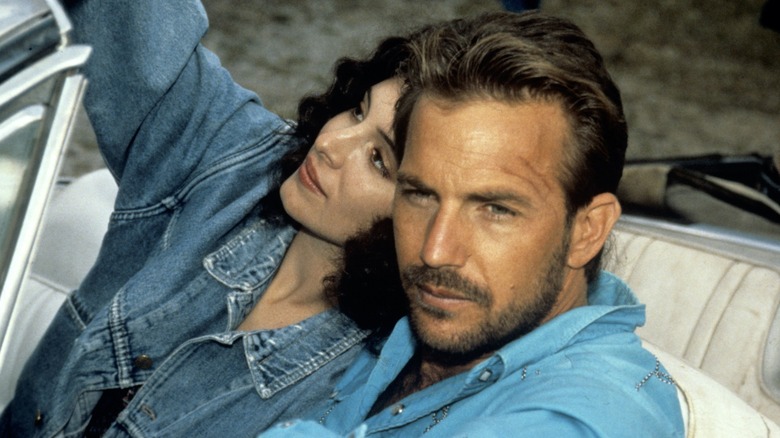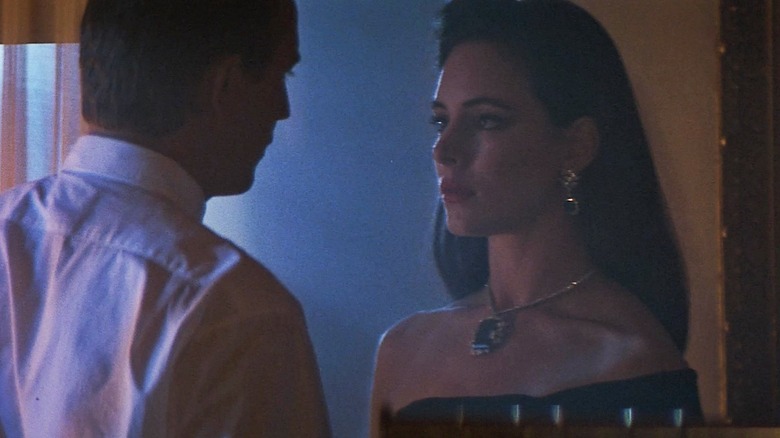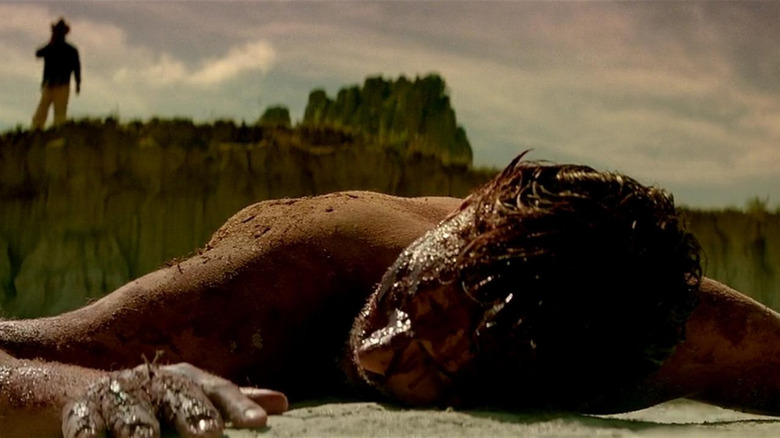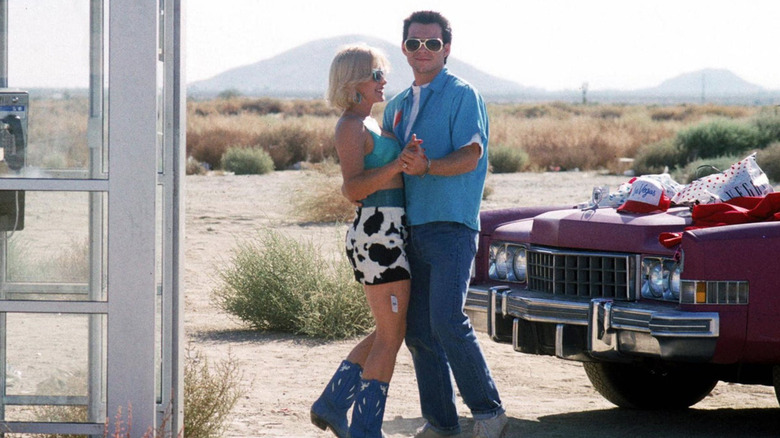One Of Quentin Tarantino's Favorite Revenge Movies Features A Dark Version Of Top Gun's Maverick
There are many mysteries in Hollywood where events seem to go against common sense or conventional wisdom. For instance: Why didn't director Tony Scott ever make a sequel to his 1986 megahit, "Top Gun?" Sure, that movie's star Tom Cruise had a lot of say in the matter, but when the film made such a huge cultural impact — so much so that the sequel, "Top Gun: Maverick," is currently blowing up the box office 36 years after the first movie — it's bizarre that a second chapter wasn't attempted.
Amongst the several answers to that question lies the fact that Scott actually did make a follow-up of sorts to "Top Gun" — two of them, if you will. The more obvious spiritual sequel is 1990's "Days of Thunder," which pairs Scott and Cruise again in a story that shifts the setting from the sky to the race track but still concerns themes of ambition, excellence, and honor.
However, it's the other pseudo-sequel Scott made to "Top Gun" that's more intriguing than "Days of Thunder" and is arguably a better film. Released just four months earlier, "Revenge" stars Madeleine Stowe as the wife of a Mexican crime lord played by Anthony Quinn, whose affair with the crime lord's American friend, Jay (Kevin Costner), lands them in deep trouble. Jay is also a U.S. Navy aviator, and the film (along with its advertising, in a way) makes him into a dark version of the "Top Gun" hero, Maverick. With "Revenge," Tony Scott sub-textually criticizes the Maverick archetype, as well as makes a gritty and emotionally harrowing revenge flick that is considered by the likes of no less than Quentin Tarantino to be one of Scott's best works.
Revenge traveled a rocky road to the screen
"Revenge" is based on a novella by author Jim Harrison that was published in 1979 along with two other short stories, one of which became the basis for 1994's Brad Pitt vehicle "Legends of the Fall." While the rights to the story were quickly purchased after its publication and Harrison was hired to adapt it for the screen (eventually co-writing with Jeffrey Fiskin), the film went through a number of big name directors who flirted with making it, amongst them John Huston and Orson Welles.
The script eventually made its way to burgeoning star Costner, who was interested in making it his directorial debut before producer Ray Stark turned down the idea. After "Top Gun" and "Beverly Hills Cop II" had been hits, Stark brought the film to Scott and the director sparked to it, shooting much of the movie on location in Mexico and bringing along his U.S. Navy connections to complete the opening title fighter jet sequence — the cockpit rig used in the film is of the exact same style as "Top Gun's."
Unfortunately, Scott and Stark didn't see eye-to-eye on the film's depictions of passionate sex and brutal violence, and Stark strong-armed Scott into releasing what the filmmaker considered a compromised theatrical cut in February of 1990. When a home video release of the film was being prepared in 2007, Scott was able to recut the movie to fit his vision, resulting in a shorter movie that nonetheless contains a more erotic, streamlined, and harrowing experience.
In any case, while the movie received mixed reviews from critics and didn't make its budget back at the box office, author Harrison was delighted with the results. "They pretty much shot the novella," he recalled in a 1990 interview. "I was so swept away by it that I cried — I really did. And I'm not known for crying."
Revenge's hero explores the dark side of the Maverick character
In "Top Gun," Maverick (Tom Cruise) is defined early in the film by a line from one of his superior officers: "Son, your ego is writing checks your body can't cash." Despite the military setting of the film, "Top Gun" is actually a sports movie in disguise, with Maverick's journey hewing closer to that of Rocky Balboa than John Rambo. Although Maverick does not end up winning the Top Gun trophy and his victory is far more personal than professional, the film feels like it lets the egotistical pilot somewhat off the hook by blithely allowing his recklessness to be acceptable, if not rewarded.
Perhaps feeling the weight of that moral responsibility, Scott doesn't allow Michael J. "Jay" Cochran in "Revenge" to get off so easily. He's introduced as another chip off the Maverick block, a cocky fighter pilot trading quips with his far more practical RIO, Madero (Jesse Corti), while he makes some dangerous maneuvers through Mexican airspace. Later, when Jay arrives at the hacienda of his mafioso friend, Tibey (Quinn), he demonstrates a level of disrespect befitting someone who believes in his American exceptionalism, and while his affair with Miryea (Stowe) is based in true love as well as pure lust, Jay continually refuses to heed the warnings of Madero and his own conscience.
As such, there's no doubt that Jay (and Miryea) hold some blame for Tibey exacting his own brand of brutal revenge on them, the crime lord disfiguring Miryea's face and trapping her inside a brothel while his goons beat Jay to a pulp and leave him for dead. In another revenge movie, Jay's journey to find Miryea and kill Tibey would likely be presented with emotionally charged excitement. Here, his quest is far more funereal, and one gets the sense he's lost before he's even begun. In his director's cut, Scott makes the tragedy of Jay's fate more than clear: not only is Jay's callsign "Ghost," but during the opening titles there are surreal glimpses of his broken and bloodied body on the Mexican dirt while a happier, cockier Jay flies overhead. The total effect makes Jay out to be a darker, doomed character, someone who won't be as lucky as Pete "Maverick" Mitchell.
Tarantino's love of Revenge leads to True Romance
While "Revenge" was not a widespread hit upon its initial release, it did connect with one particularly influential person: Quentin Tarantino. The filmmaker's directing debut, "Reservoir Dogs," was still a few years off, but he'd written a few screenplays that were making the rounds in Hollywood: "Natural Born Killers" and "True Romance," the latter of which eventually found its way to Scott's desk.
Tarantino couldn't have been more thrilled that Scott was in the running to make "True Romance," and that was all due to loving "Revenge." As Tarantino recalled when interviewed in 2003:
"I'm a huge fan of that movie. In fact, that was the reason I was supportive and really tried to make it happen that Tony directed True Romance. I was like, I want the man who did Revenge to do my movie."
Scott did end up making "True Romance," and in the way "Revenge" acts as a pseudo-sequel to "Top Gun," "True Romance" acts as a companion piece to "Revenge." In "True Romance," lovers-on-the-run Clarence (Christian Slater) and Alabama (Patricia Arquette) find themselves beset on all sides by Hollywood sleazeballs, Detroit mafia dons and California cops, their romance seemingly as doomed as Jay and Miryea's. That's because in Tarantino's original script, it was — Clarence was intended to perish in the film's climactic gun battle. Yet Scott insisted on a version where both lovers survive, and that was what ended up in the movie.
In addition to providing pulse-pounding excitement, charming romance or brutal tragedy, it's clear just from these few examples that the films of Tony Scott have a lot more going on beneath their gaudy, flashy surface.



